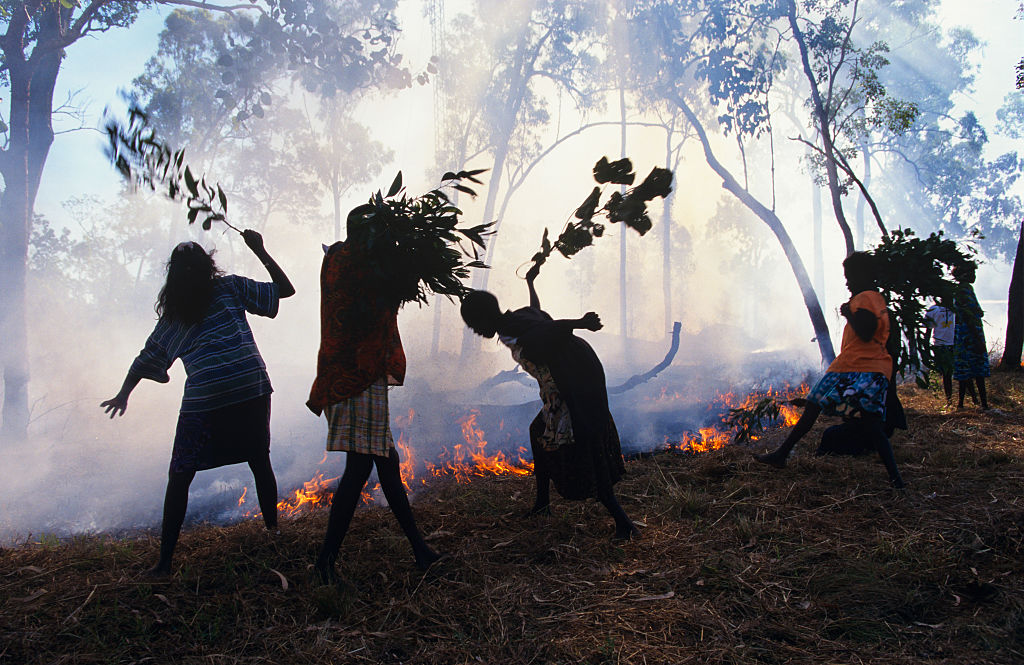The threat spectrum

Planet A
Climate change is intensifying the massive bushfire sweeping across the Northern Territory’s Barkly region. The fire, which started last Friday and has torn through two million hectares, is one of many burning in the territory.
It is predicted that a massive area of the NT will burn during this year’s fire season which is projected to be one of the territory’s worst since 2011. The fire season has also begun in New South Wales and Queensland, with El Niño and climate change likely to exacerbate the expected hot and dry weather and the frequency of bushfires.
The Barkly fires come in the wake of the climate-induced wildfires in the Northern Hemisphere. In recent months, wildfires have blazed in North America, western Europe and the Mediterranean with research revealing that August’s Maui blaze in Hawaii was one of the deadliest US wildfires in over 100 years.
Democracy watch
In Iran, sporadic protests marking the first anniversary of the death of Mahsa Amini persist despite a crackdown by security forces. The 22-year-old Kurdish woman died in custody after being arrested by Iran’s morality police for not adhering to mandatory dress codes. Her death sparked widespread political unrest with some of the most substantial protests against clerical rule in four decades. Iran’s foreign ministry dismissed Western support for women’s rights as ‘double standards and lies’ and said the West did not understand Islamic laws.
Human rights groups said Masha’s father, Amjad, was briefly held by the Iranian revolutionary guard and warned not to commemorate his daughter’s death. That blocked a planned vigil at her gravesite. The Iranian state news agency, IRNA, denied this claim and later said security forces had foiled an attempt to assassinate Amjad. Meanwhile, the Kurdistan Human Rights Network has reported that family members of other people killed during the protests sparked by Masha’s death have also been arrested or threatened.
Information operations
With Japan’s release of treated water from the wrecked Fukushima nuclear plant, Beijing’s state-backed disinformation and fake news campaigns are stoking anger and fear in China’s populace. A UK-based data analysis firm revealed a coordinated disinformation campaign by the Chinese government and state media as far back as January. This campaign has strategically aimed at sowing doubt about the scientific basis of the wastewater discharge, intensifying public anger since its initiation on 24 August.
Within controlled Chinese information channels, the term ‘nuclear-contaminated wastewater’ has been consistently used to align with Beijing and state media’s attempts to discredit Japan’s water treatment process. China has also run paid ads on platforms like Facebook and Instagram in different countries and languages. They say Japan and its partners prioritise geopolitical interests over ethics, international norms and science. Japan faces the challenge of conveying complex scientific information to calm an emotionally-charged issue.
Follow the money
Military ties between Pyongyang and Moscow have strengthened after a rare foreign visit by Kim Jong-un to key military and technology sites in Russia’s far east. While no arms deals were made public, Kim Jong-un and Vladimir Putin reportedly negotiated the possible exchange of North Korean artillery and ammunition for Russian food and advanced submarine and ballistic technologies.
North Korea has stockpiled an estimated 10,000 artillery pieces and tens of millions of shells in calibres that could be used by Russia in its war on Ukraine. The US State Department has warned that it will impose new sanctions if North Korea supplies Russia with military hardware.
The increased engagement marks a broader shift in North Korean diplomacy. Rather than negotiate directly with Washington, Kim Jong-un has taken decisive steps toward closer alignment with Russia and China against the US in a move that could seriously undermine US-led deterrence efforts in the Indo-Pacific region.
Terror byte
The United Kingdom last week officially proscribed Russia’s Wagner Group as a terrorist organisation. The order makes belonging to the mercenary group or supporting it a criminal offence with a potential jail sentence of 14 years alongside or in place of a fine. Punishable offences including arranging meetings to further Wagner’s activities, expressing support for its aims, and displaying Wagner’s logo.
Wagner has played a prominent role in Russia’s invasion of Ukraine since it began in February 2022. The UK home secretary stated that the organisation ‘has acted as a military tool of Vladimir Putin’s Russia overseas’ and ‘has been involved in looting, torture and barbarous murders’. Aside from Ukraine, the organisation has been active in conflicts in Syria, Central African Republic, Sudan and Libya.
The Wagner Group is the 79th organisation to be added to the UK’s terrorist list, joining the likes of ISIS and Al-Qaeda.